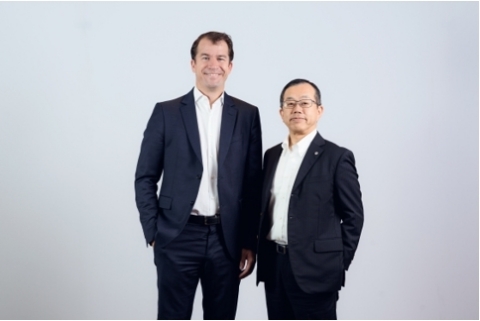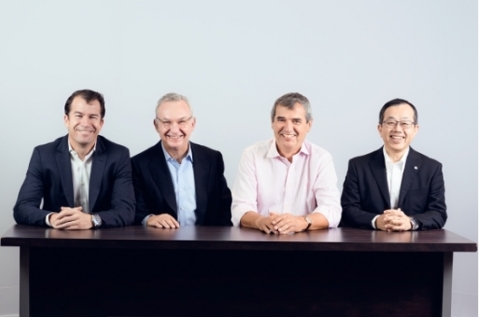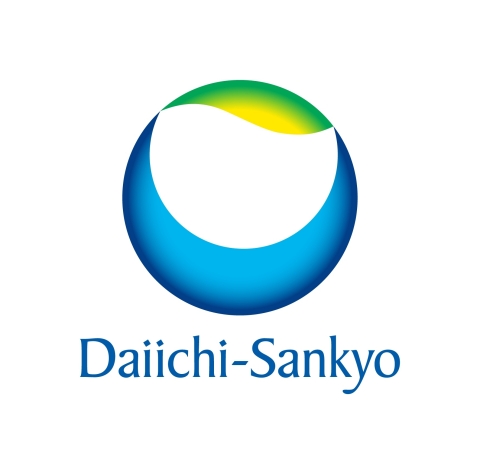TOKYO & MUNICH & BASKING RIDGE, N.J.--(BUSINESS WIRE)--Daiichi Sankyo Company, Limited (hereafter, Daiichi Sankyo) and AstraZeneca today presented positive detailed data from the global pivotal phase 2 single-arm DESTINY-Breast01 trial of DS-8201 ([fam-] trastuzumab deruxtecan), an investigational HER2 targeting antibody drug conjugate (ADC), in patients with HER2 positive metastatic breast cancer. The data were part of the press program at the 2019 San Antonio Breast Cancer Symposium (#SABCS19) and simultaneously published online in The New England Journal of Medicine.
The primary endpoint of objective response rate (ORR), confirmed by independent central review, was 60.9% with DS-8201 monotherapy (5.4mg/kg) in patients with HER2 positive metastatic breast cancer who received two or more prior HER2 targeted regimens. Patients achieved a disease control rate (DCR) of 97.3% with a median duration of response (DOR) of 14.8 months (range 13.8 - 16.9) and median progression-free survival of 16.4 months (range 12.7 - not reached). The median overall survival (OS) has not yet been reached with an estimated survival rate for patients receiving DS-8201 of 86% at one year. The results were consistent across subgroups of patients.
Patients receiving DS-8201 in the DESTINY-Breast01 trial had a median of six prior regimens for metastatic disease (range 2 - 27), including ado-trastuzumab emtansine (T-DM1) (100%), trastuzumab (100%), pertuzumab (65.8%), other anti-HER2 therapies (54.3%), hormone therapies (48.9%), and other systemic therapies (99.5%). Median treatment duration for DS-8201 was 10 months (range: 0.7 - 20.5 months) with a median duration of follow-up of 11.1 months (range: 0.7 - 19.9). As of data cut-off on August 1, 2019, 42.9% of patients remained on-treatment.
The safety and tolerability profile of DS-8201 in DESTINY-Breast01 was consistent with that observed in the phase 1 trial. The most common grade 3 or higher treatment emergent adverse events were decreased neutrophil count (20.7%), anemia (8.7%), nausea (7.6%), decreased white blood cell count (6.5%), decreased lymphocyte count (6.5%) and fatigue (6%). Overall, 13.6% of patients had confirmed interstitial lung disease (ILD) related to treatment as determined by an independent review. The events were primarily grade 1 or 2 (10.9%) in severity with one grade 3 (0.5%) and no grade 4 events. Four deaths (2.2%) were determined to be due to ILD.
Regulatory submission of DS-8201 for the treatment of patients with HER2 positive metastatic breast cancer was recently accepted with Priority Review by the U.S. Food and Drug Administration (FDA). A regulatory submission also has been made to Japan’s Ministry of Health, Labour and Welfare (MHLW).
“These results are particularly striking as DS-8201 prompted a high level of durable tumor reduction among patients, the majority of whom had exhausted most, if not all, standard therapies for the treatment of HER2 metastatic breast cancer,” said Ian E. Krop, MD, PhD, Associate Chief, Division of Breast Oncology, Susan F. Smith Center for Women's Cancers, Dana-Farber Cancer Institute. “We are excited by these results and their potential to help patients with this advanced stage of breast cancer.”
“The strength of the pivotal results and the consistency with previously reported DS-8201 data further underscore that this specifically engineered HER2 targeted antibody drug conjugate is delivering on its intent of enhancing efficacy for patients with HER2 positive metastatic breast cancer,” said Antoine Yver, MD, MSc, Executive Vice President and Global Head, Oncology Research and Development, Daiichi Sankyo.
“The clinically meaningful and durable responses seen among these patients illustrate the potential of DS-8201 to establish a new standard of care,” said José Baselga, MD, PhD, Executive Vice President, R&D Oncology, AstraZeneca. “These results are impressive, as women with this advanced stage of breast cancer have already endured multiple prior therapies for HER2 positive metastatic breast cancer.”
Summary of Resultsi
Efficacy measure |
Total evaluable (n=184)ii |
ORR (%) (95% CI) |
60.9 (53.4-68) |
CR (%)iii |
6.0 |
PR (%)iii |
54.9 |
SD (%)iii |
36.4 |
PD (%) |
1.6 |
CBR (%)iv |
76.1 (69.3-82.1) |
Median DoR (95% CI) |
14.8 months (13.8-16.9) |
Median PFS (95% CI) |
16.4 months (12.7-NE) |
Median OS (95% CI) |
NE (NE-NE) |
Estimated OS at 12 months (%) (95% CI) |
86 (80-91) |
CI, confidence interval; CR, complete response; PR, partial response; SD, stable disease; PD, progressive disease; CBR, clinical benefit rate; NE, not estimable
i As assessed by independent central review
ii 5.4 mg/kg
iii DCR is (CR + PR + SD) is 97.3% (95% CI, 93.8-99.1)
iv Responses lasting greater than six months
About HER2
HER2 is a tyrosine kinase receptor growth-promoting protein found on the surface of some cancer cells that is associated with aggressive disease and poor prognosis in patients with breast cancer.1 To be considered HER2 positive, tumor cancer cells are usually tested by one of two methods: immunohistochemistry (IHC) or fluorescent in situ hybridization (FISH). IHC test results are reported as: 0, IHC 1+, IHC 2+, or IHC 3+.2 A finding of IHC 3+ and/or FISH amplification is considered positive.2
About HER2 Positive Breast Cancer
Approximately one in five breast cancers are HER2 positive.2,3 Despite recent improvements and approvals of new medicines, there remain significant unmet needs for patients with advanced HER2 positive metastatic breast cancer.4,5 This disease remains incurable with patients eventually progressing after available treatment.4,5
About DESTINY-Breast01
DESTINY-Breast01 is a pivotal phase 2, single-arm, open-label, global, multicenter, two-part trial evaluating the safety and efficacy of DS-8201 in patients with HER2 positive unresectable and/or metastatic breast cancer previously treated with ado-trastuzumab emtansine. The primary endpoint of the trial is objective response rate, as determined by independent central review. Secondary objectives include, duration of response, disease control rate, clinical benefit rate, progression-free survival, and overall survival. Enrollment into DESTINY-Breast01 was completed in September 2018 with 253 patients at more than 100 sites across North America, Europe, Japan and other countries in Asia.
About DS-8201
DS-8201 (fam- trastuzumab deruxtecan in U.S. only; trastuzumab deruxtecan in other regions of world) is the lead product in the investigational ADC Franchise of the Daiichi Sankyo Cancer Enterprise and the most advanced program in AstraZeneca’s ADC scientific platform.
In March 2019, Daiichi Sankyo and AstraZeneca entered into a global collaboration to jointly develop and commercialize DS-8201 as a potential new medicine worldwide, except in Japan where Daiichi Sankyo will maintain exclusive rights. Daiichi Sankyo will be solely responsible for the manufacturing and supply.
A comprehensive development program for DS-8201 is underway globally with five pivotal trials in HER2 expressing metastatic breast and gastric cancer, including a trial in patients with metastatic breast cancer and low levels of HER2 expression (HER2 low). Phase 2 trials are underway for HER2 expressing advanced colorectal cancer as well as metastatic non-squamous HER2 overexpressing or HER2 mutated non-small cell lung cancer. Trials in combination with other anticancer treatments, such as immunotherapy, also are underway.
The U.S. Food and Drug Administration (FDA) recently granted Priority Review for the Biologics License Application (BLA) for DS-8201 for the treatment of HER2 metastatic breast cancer, which previously received Breakthrough Therapy and Fast Track Designation. A regulatory submission for DS-8201 also has been made to Japan’s Ministry of Health, Labour and Welfare (MHLW) for the treatment of HER2 positive metastatic breast cancer, and it has previously received SAKIGAKE designation for the treatment of advanced HER2 positive gastric or gastroesophageal junction cancer by Japan’s MHLW.
DS-8201 is an investigational agent that has not been approved for any indication in any country. Safety and efficacy have not been established.
About Daiichi Sankyo Cancer Enterprise
The mission of Daiichi Sankyo Cancer Enterprise is to leverage our world-class, innovative science and push beyond traditional thinking to create meaningful treatments for patients with cancer. We are dedicated to transforming science into value for patients, and this sense of obligation informs everything we do. Anchored by three pillars including our investigational Antibody Drug Conjugate Franchise, Acute Myeloid Leukemia Franchise and Breakthrough Science pipeline, we aim to deliver seven distinct new molecular entities over eight years during 2018 to 2025. Our powerful research engines include two laboratories for biologic/immuno-oncology and small molecules in Japan, and Plexxikon Inc., our small molecule structure-guided R&D center in Berkeley, CA. For more information, please visit: www.DSCancerEnterprise.com.
About Daiichi Sankyo
Daiichi Sankyo Group is dedicated to the creation and supply of innovative pharmaceutical therapies to improve standards of care and address diversified, unmet medical needs of people globally by leveraging our world-class science and technology. With more than 100 years of scientific expertise and a presence in more than 20 countries, Daiichi Sankyo and its 15,000 employees around the world draw upon a rich legacy of innovation and a robust pipeline of promising new medicines to help people. In addition to a strong portfolio of medicines for cardiovascular diseases, under the Group’s 2025 Vision to become a “Global Pharma Innovator with Competitive Advantage in Oncology,” Daiichi Sankyo is primarily focused on providing novel therapies in oncology, as well as other research areas centered around rare diseases and immune disorders. For more information, please visit: www.daiichisankyo.com.
References
1 American Cancer Society. Breast Cancer HER2 Status. Available at https://www.cancer.org/cancer/breast-cancer/understanding-a-breast-cancer-diagnosis/breast-cancer-her2-status.html. Accessed August 2019.
2 Tandon A, et al. HER-2/neu Oncogene Protein and Prognosis in Breast Cancer. J Clin Oncol. 1989;7(8):1120-8.
3 Sledge G, et al. Past, Present, and Future Challenges in Breast Cancer Treatment. J Clin Oncol. 2014;32(19):1979-1986.
4 de Melo Gagliato D, et al. Mechanisms of Resistance and Sensitivity to Anti-HER2 Therapies in HER2+ Breast Cancer. Oncotarget. 2016;7(39):64431-46.
5 National Comprehensive Cancer Network (NCCN). NCCN Guidelines. Breast Cancer. Available at https://nccn.org. Accessed August 2019.






